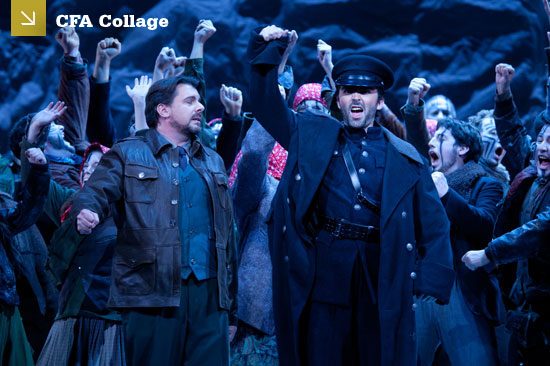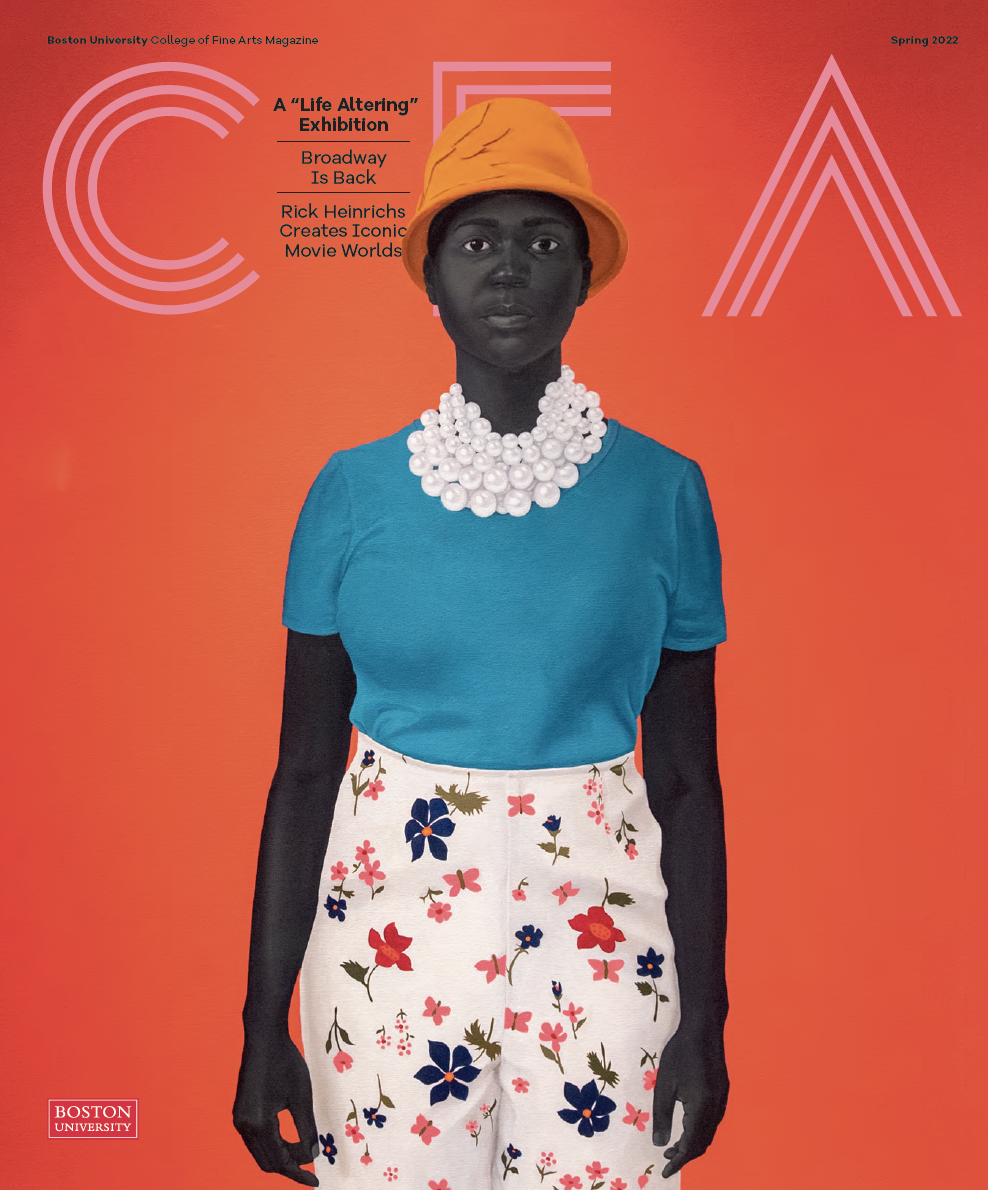CFA Collage
Richard Crawley (Macduff) and John Irvin (Malcolm) with members of the BLO Chorus. Photo by Erik Jacobs for Boston Lyric Opera
Strengthening Ties with the BLO
On stage, in the pit, and behind the scenes, 30 members of the CFA community participated in Boston Lyric Opera’s season-opening production of Verdi’s Macbeth in early November. The cast featured Opera Institute graduate David Cushing (’04), current Opera Institute student John Irvin (’12), and Assistant Professor of Voice James Demler. CFA alumni, students, and faculty members also sang in the chorus, played with the orchestra (woodwinds, brass, and strings), and contributed to costume, lighting, and set design.
How did so many CFA affiliates end up on (or near) the BLO stage? Such high CFA participation, says Opera Institute Director Sharon Daniels, is a reflection of a longstanding informal relationship between the College and BLO and is also the result of a more formal collaboration recently begun under BLO’s new leadership. The partnership includes master classes for CFA students with BLO artistic staff, an opera arts course taught by BLO dramaturge John Conklin, and opportunities for CFA students and recent graduates to participate in BLO’s Emerging Artists program.
Beginning with its 2011–2012 season, BLO will help nurture young operatic talent by annually selecting nine Emerging Artists—seven singers and two coach/accompanists—to participate with the opera company onstage, in rehearsal, and at special events. Fully half of the singers chosen as Emerging Artists this season are alumni of the Opera Institute: soprano Meredith Hansen (’02), bass-baritone David Cushing (’04), and tenor John Irvin (’12). —Corinne Steinbrenner
In Memoriam
David Wheeler

Photo courtesy of American Repertory Theater
Associate Professor, School of Theatre, on January 4, 2012, at 86. Director and educator David Wheeler was a driving force in the Boston theatre scene. In 1963, he founded the legendary Theatre Company of Boston and served as its artistic director until 1975, working with a litany of now-famous actors, including Dustin Hoffman, Robert De Niro, Robert Duvall, Spalding Gray, Stockard Channing, and Al Pacino, who has called Wheeler “one of the lights of my life.”
Wheeler later served as resident director at the American Repertory Theater in Cambridge and directed successful productions for many other New England theatre companies. He also taught at several Boston-area universities, including Harvard, Brandeis, and BU, where he was an inspiring teacher of directing and dramatic literature from 1966 to 1979.
In a remembrance written for radio station WBUR, Boston theatre critic Ed Siegel (CAS’71) says audiences flocked to Wheeler’s productions for the “clarity, insight, and imagination that Wheeler brought to whatever he was directing—making the text come first and adapting the acting, set design, lighting, and everything else to serve those words.”
Wheeler, a veteran of World War II, is survived by his son, Lewis, and his wife, Bronia (CAS’47, GRS’48). The American Repertory Theater plans to host a public memorial service for Wheeler on Monday, May 14. —Corinne Steinbrenner
David Pressman
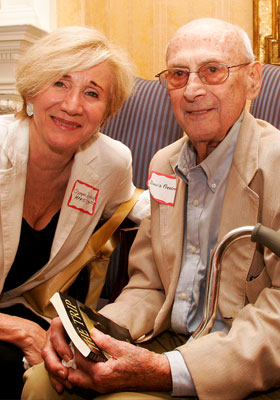
Photo by Michael Nelson
Former Chair, Department of Acting & Directing, School of Theatre, on August 29, 2011, at 97. A legendary television director, David Pressman made a lasting impact on the School of Theatre as founder of its acting and directing programs.
Born in 1913 in Tbilisi in what is now the Republic of Georgia, Pressman came to the United States at age 9. He began his career in the 1930s as a stage actor and director and then found success directing the new medium of television.
Pressman’s TV career came to a halt during the McCarthy era, when he was blacklisted for membership in the Communist Party. He was recruited to BU in 1954 by opera impresario Sarah Caldwell and served on the faculty of the then Division of Theatre Arts until 1959, leading the creation of the Department of Acting & Directing and forging important ties between the department and theatre professionals.
Pressman eventually returned to television, earning three Daytime Emmys during his 25 years as director of ABC’s One Life to Live.
A School of Theatre reunion honoring Pressman in 2004 was a standing-room-only affair, attended by such renowned actors as Verna Bloom (’59) and Olympia Dukakis (SAR’53, CFA’57, Hon.’00). —Corinne Steinbrenner
James V. “Tim” Nicholson

Photo by BU Photography
Professor Emeritus, School of Theatre, on August 9, 2011, at 84. Characterized as a team player and a talented theatre artist completely without ego, Tim Nicholson was held in great respect and affection by colleagues and students alike.
Nicholson came to BU in 1957, initially teaching lighting design, stagecraft, and theatre practice. In 1970, he assumed additional administrative duties, began teaching graduate directing, and became the primary advisor for all graduate students.
Even after his retirement in 1989, Nicholson continued to work on projects for the CFA community. Among them was the publication, Boston University College of Fine Arts, Reflections on the First 50 Years, 1954–2004, on which he collaborated with longtime colleagues William Lacey and Judith Flynn. In 2006, he made a generous gift to the College to refurbish the antique lighting fixtures in the Boston University Theatre.
“Tim was deeply devoted to the BU School of Theatre,” says Jim Petosa, director of the School. “His generosity was proof of his care, and his gentlemanly advice and expressions of support were always welcome to hear and receive. He will be greatly missed by our community.” —Ellen Carr
Jon Lipsky
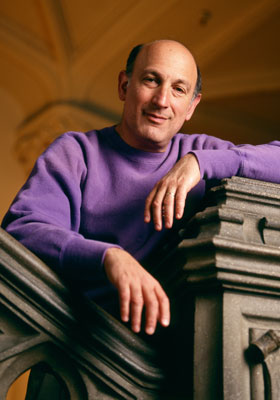
Photo by Vernon Doucette
Professor, School of Theatre, on March 19, 2011, at 66. As a director, Jon Lipsky knew how to elicit the best from his actors. He believed that art lay hidden in the depths of one’s body, one’s soul, and one’s dreams.
“He did not force the work; he summoned it. Magically and reliably, he summoned it,” says Christopher Bannow (’09), who was among the thousands of students Lipsky inspired during his 28-year tenure as a playwriting and acting instructor at CFA.
Lipsky’s ability to translate emotions to the stage earned him critical acclaim. In 2007, he received the Elliot Norton Award for Best Direction for the plays Coming Up for Air (Alliger Arts) and King of the Jews (Boston Playwrights’ Theatre).
In the late 1970s, Lipsky became the in-house dramatist for Boston Theatre Works. During this time, he wrote Beginner’s Luck, They All Want to Play Hamlet, and A Matter of Ecstasy. His later plays include Maggie’s Riff, Molly Maguire, Book of Revelations, and The Survivor: A Cambodian Odyssey.
His book Dreaming Together: Explore Your Dreams by Acting Them Out was published in 2008. Dreams provided the basis for Lipsky’s full-length plays Dreaming with an AIDS Patient and The Wild Place. —Samantha Dubois
James Spruill (’75)
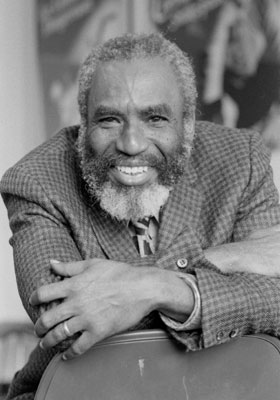
Photo by Kalman Zabarsky
Associate Professor, School of Theatre, on December 31, 2010, at 73. Over the course of a five-decade career, James Spruill made his mark as an actor, a director, and a leader in the African American theatre community, but he is remembered foremost as an impassioned, dynamic educator.
“Jim Spruill was unfiltered, provocative, nurturing, challenging, and, most of all, devoted to his students and the art of teaching acting,” recalls Nina Tassler (’79), a BU trustee and president of CBS Entertainment.
Spruill came to Boston as an actor in the mid-1960s and, in 1968, cofounded the New African Company, which continues to mount the work of African American playwrights on stages across Boston, as well as in schools, colleges, prisons, and hospitals. He joined the CFA faculty in 1976 and taught acting, directing, theatre history, and literature until his retirement in 2006.
In addition to his stage performances, Spruill appeared on television and in several movies, among them the Steven Spielberg (Hon.’09) film Amistad. He also had roles in several films made by his son, Robert Patton-Spruill (CAS’92, COM’94), including Squeeze and Body Count. —John O’Rourke
Raphael Hillyer
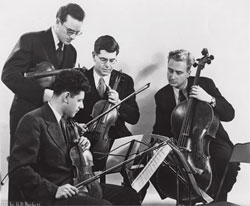
The original Juilliard String Quartet (from left): Robert Mann, Robert Koff, Raphael Hillyer, Arthur Winograd. Photo by G. D. Hackett
Adjunct Professor, School of Music, on December 27, 2010, at 96. The founding violist of the Juilliard String Quartet, Raphael Hillyer taught viola lessons and chamber music studies at CFA from 1981 until December 6, 2010, just weeks before his death. A member of the Juilliard String Quartet for more than 20 years, Hillyer helped revitalize traditional chamber music, influencing and mentoring many younger quartets that followed.
Born in 1914 in Ithaca, New York, Hillyer began studying violin at age seven and joined the Boston Symphony Orchestra as a violinist in 1942. Four years later, he borrowed a viola and learned enough to successfully audition for the Juilliard String Quartet, which quickly gained acclaim for its innovative set lists.
After leaving the quartet in 1969, Hillyer began a teaching career that included posts at American University, Juilliard, Yale, Harvard, and BU.
Steven Ansell, principal viola of the Boston Symphony Orchestra and associate professor in the School of Music, told the Boston Globe that Hillyer “was a tremendous player, without a doubt one of the best violists of his generation.’’ —Samantha Dubois
A Greener CFA
For two years running, Boston University has been highlighted in the Princeton Review’s Guide to Green Colleges, thanks in part to the efforts at CFA.
A few years ago, a group of CFA staff initiated a recycling program for the building at 855 Comm. Ave., as well as for the College’s facilities across the street at 808. Now, every Friday at noon, students and staff for each floor collect blue bins full of paper, glass, and plastic, to be carted off by local recycling company Save That Stuff. Moreover, the Schools of Visual Arts and Theatre make it a point to reuse canvases, sets, and costumes, saving money as well as the environment. CFA buyers purchase greener paints and recycled or sustainable goods.

“We’re really on the move in terms of recycling,” says Liz Phillips, who spearheaded the initiative, called CFA Green. Phillips (MET’08) is the department administrator for the School of Theatre and managing director of the Boston Center for American Performance. “That’s true across the University. I like to think that CFA Green and a couple other groups started that in motion.”
Indeed, a year after the birth of CFA Green, Boston University formed a central Sustainability office to coordinate such efforts campus-wide. The recycling rate on the Charles River Campus shot up from 3 percent in 2006 to 24 percent in 2010. The Sustainability team credits this progress in part to the grassroots advocacy and efforts that bubbled up from the staff, students, and faculty at a few schools and colleges, such as CFA and the School of Education.
“We would be doing our students a disservice not to show them how to live a sustainable life,” says Phillips. “Even just doing the small things is really important.” —Patrick L. Kennedy

